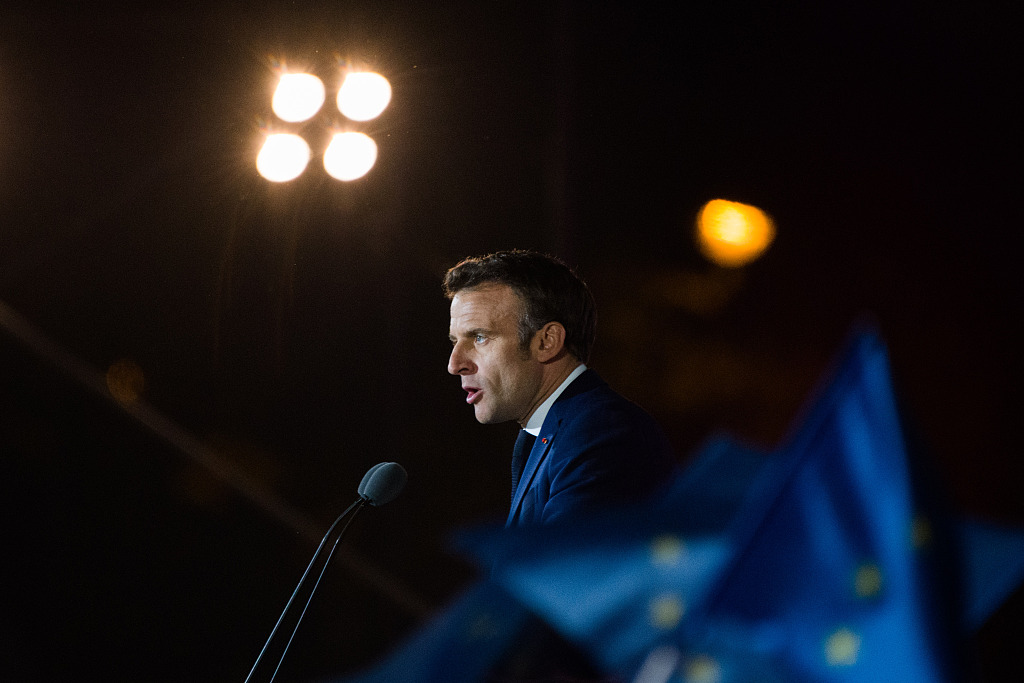Another 5 years for Emmanuel Macron
- By George N. Tzogopoulos
 0 Comment(s)
0 Comment(s) Print
Print E-mail China.org.cn, April 29, 2022
E-mail China.org.cn, April 29, 2022

Emmanuel Macron will stay at the Élysée Palace for another term of five years. The April 24 presidential election witnessed him win against his political opponent Marine Le Pen. His victory was clear but not as easy as it had been in 2017. In particular, Macron's percentage decreased from 66.1% to 58.8%, while in contrast, that of Le Pen increased from 33.9% to 41.4%. In terms of the number of voters, around 2 million people apparently did not trust the French president this time. For her part, Le Pen, the leader of the National Rally (Rassemblement National), managed to gather approximately 2.3 million more supporters than five years ago.
Despite those gains, the result was unsurprising. Macron's main advantage has been his centrist and pro-EU stance against a politician who belongs to the far-right political spectrum and would be keen on reconsidering the position of France within the EU and NATO. The majority of French citizens are not prepared for such a tectonic political change, although the rise of Le Pen's performance is certainly remarkable.
Another parameter from the presidential election worth mentioning is the high percentage of abstention, which reached 28%, the highest number since 1969. The number of French citizens who did not go to the polls last Sunday was 13,656,109 compared to 12,101,366 in the second round of the presidential election of 2017. More importantly, it was younger voters who showed indifference toward both Macron or Le Pen at the polling stations. This mirrors a typical attitude among the younger generation in recent years, not only in France but also in other member-states of the European Union.
Additionally, French society demonstrated signs of economic and labor division. According to IPSOS, a polling company that conducted a detailed survey of how citizens voted in the second round, Macron's supporters principally included professionals, executives, the retired, the rich, and well-educated people. On the contrary, Le Pen relied mostly on the working class, unemployed, poorer, and less educated persons. According to IPSOS data, however, Macron was the winner across all age categories, with the exception of those between 50 and 59 years old. One possible reason is that citizens of that age range felt threatened by pension reform plans and the proposed increase of the retirement age to 65.
Macron's success distinguishes him from his two predecessors, Nicolas Sarkozy and François Hollande, who failed to win re-election in 2012 and 2017, respectively. The political scene in France during his leadership is also different in comparison to the period prior. That is because traditional political parties, namely the Republicans and the Socialists, have almost completely lost their power. In parallel with Macron and Le Pen, veteran leftist politician Jean-Luc Mélenchon is garnering a significant part of the electorate. Mélenchon was close to entering the second round of the presidential election but lost to Le Pen with a small difference on April 10 (21.15% to 23.15%).
Macron's domestic task in the next five years will be tough and challenging. Economic problems for ordinary citizens and the pandemic ought to be his focus. Also, his reform agenda that clashed with the "Yellow Jackets" movement in 2018 and was later abandoned due to the spread of the coronavirus needs to be re-energized in the medium-term. The realization of future policies will, inter alia, depend on the result of the parliamentary elections this June. If Macron preserves the majority, things will be simplified for his government. If not, he will need to find a way forward on the grounds of the so-called cohabitation, the necessary symbiosis between a president and a parliamentary majority with a different ideology. In less than six weeks, French citizens will decide whether to authorize the French president to uninterruptedly implement his agenda or to set certain obstacles to impede its progress.
George N. Tzogopoulos is a columnist with China.org.cn. For more information please visit:
http://www.china.org.cn/opinion/GeorgeNTzogopoulos.htm
Opinion articles reflect the views of their authors, not necessarily those of China.org.cn.
If you would like to contribute, please contact us at opinion@china.org.cn.






Go to Forum >>0 Comment(s)